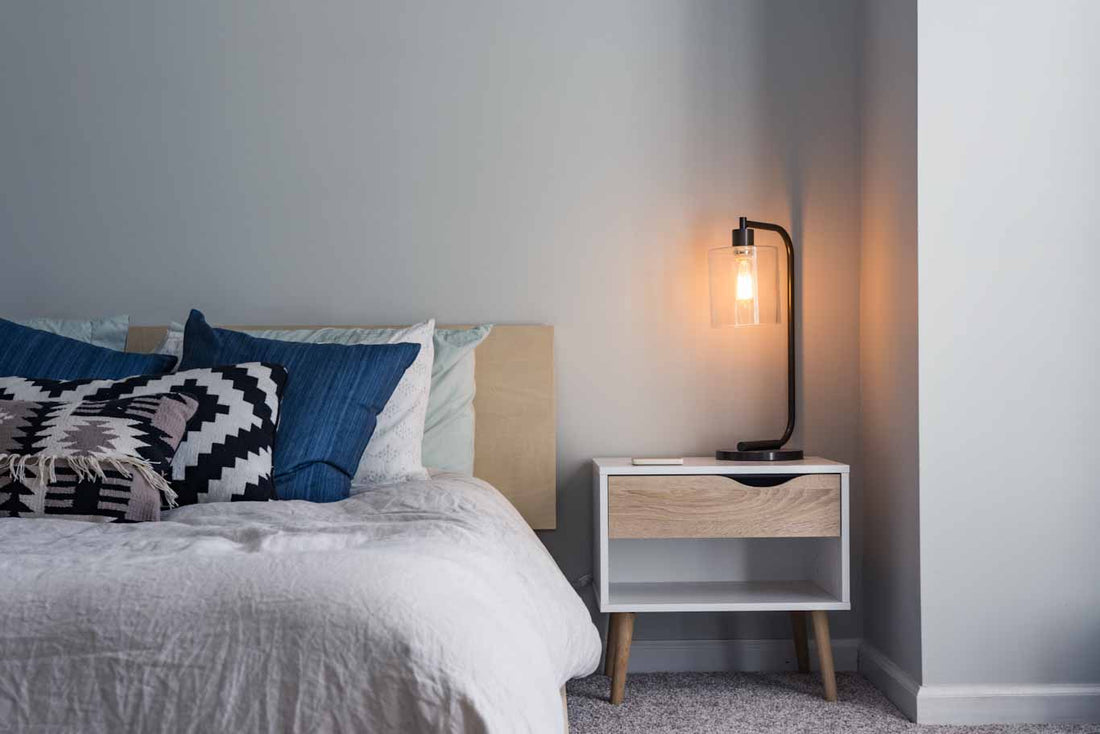
How to Sleep in Any Rental Property
Josie SivignyMoving to a new home is exciting, but it can also be a bit stressful. With all the new noises, a new room arrangement, and more, something as easy as sleeping can quickly become a challenge. While a few nights of subpar sleep are normal, a lack of sleep can quickly impact your life.
If you’re struggling to catch some ZZZs in your new rental property, here are some tips that can help you get a good night’s sleep and wake up refreshed.
1. Determine the cause of your sleep issues.
Even if you suspect that moving to a new property has caused your sleep problems, you’ll need to figure out exactly what is preventing you from getting enough shuteye.
How’s your mental health?
First, consider your mental health. After searching for an apartment, finding the right one is exciting! However, moving to a new city or even a new apartment in the same town can be stressful. Add in starting a new job, trying to make new friends, and figuring out how to get around, and it’s possible you have a long mental to-do list. Even if you feel drowsy and want to go to sleep early, racing thoughts can prevent you from drifting off.
What’s your sleeping environment like?
Another reason you might be struggling to get enough hours of sleep is that you’re still adjusting to your new physical environment. Even with a great mattress, getting used to your loud downstairs neighbors or the streetlights outside your window takes time. Or maybe you’ve moved in with new roommates who aren’t the most considerate.
Could it be a medical issue?
Finally, consider that you might have a more serious sleep disorder like sleep apnea, or your sleep may be affected by depression or anxiety. If your sleep quality is still suffering months after moving, it’s a good idea to check in with your doctor. They will be able to diagnose any serious sleep issues and prescribe any necessary sleep medicine.
2. Make your bed and bedroom an oasis.
When you walk into your bedroom at night, it should feel like a retreat that lulls you to sleep. If this isn’t the case, you can transform your bedroom with just a little bit of effort.
Invest in your bedroom.
You spend 1/3 of your life sleeping, so you should definitely put care into where you rest your head. Of course, choosing the right mattress is essential. Seriously, a mattress is not something you should skimp on. But make sure to pay attention to your sheets and pillows as well.
Keep your room tidy.
If you walk into a messy room, you’ll feel frazzled rather than relaxed. By keeping your belongings in order and making your bed each day, you’ll return to a welcoming oasis at night.
Avoid electronics before bedtime.
Take note of how you use electronic devices in your bedroom. If you’re having trouble drifting off, you may be tempted to reach for your phone. However, the blue light that phones release can impact the production of melatonin and therefore disrupt your circadian rhythm. The National Sleep Foundation recommends avoiding electronics for at least an hour before you hit the hay.
Avoiding screens also removes the stress caused by nighttime email reading. If you’re struggling to avoid your devices, take them out of your bedroom. Remember, a good old-fashioned alarm clock can wake you up and tell the time just as well as your phone.
Keep it cool.
Finally, consider lowering your bedroom’s temperature at night. Your body temperature actually decreases as you start to fall asleep, so a colder room can help keep you comfortable while you sleep.

3. Address noise and light issues.
Your new apartment might come with sounds and lights you’re not used to.
Drown out unwelcome noises.
Whether it’s an upstairs neighbor’s heavy feet or a 4AM garbage pickup, new noises are likely to keep you awake or wake you up in the middle of the night. To help drown out these sounds, consider a white noise machine or a box fan that creates a similar white noise.
Make the room as dark as possible.
Diminish any glow from streetlights, surrounding businesses, or even a bright full moon. Blackout curtains easily block light and can help you sleep better. You can also try an eye mask if you don’t want to invest in curtains.
Embrace the light when you’re awake.
While darkness helps you sleep at night, it’s also important that you get enough light exposure during the day. Melatonin production decreases with bright light, so lights help keep you awake during the day. If you’re cooped up in a dark office all day, you may find yourself drifting off during the day and unable to sleep at night.

4. Try adding in relaxation techniques.
Relaxation techniques such as yoga, meditation, or journaling can help you wind down before bed, as they are shown to help reduce your stress and therefore improve your sleep. Meditation can be as simple as deep breathing exercises, and journaling can consist of you scribbling down any pressing thoughts.
5. Build patterns so you know when bedtime comes.
When you move into a new place, it’s normal to veer from your normal schedule and routine. However, try to revert back to your bedtime routine as soon as possible so you can get back on track.
Be consistent with your bedtime and wake-up times.
One of the most important things you can do to get a good night’s sleep is to follow a consistent sleep schedule. This means waking up and going to bed around the same time each day, including weekends. Also, avoid caffeine and napping in the afternoon.
Do something before bed and stick with it.
It’s also important to develop a nighttime routine so you’re actually ready to fall asleep once it’s bedtime. This may include a warm bath, writing in a journal, reading for 15 minutes, or anything else that relaxes your mind and signals that it’s time to sleep. Even if you think you’re a night owl, a consistent bedtime routine will signal to your brain that it’s time to sleep. This routine may take a while to become effective, so don’t give up on it after just a few nights.
Rest easy in your new home.
Moving to a new home is exciting, and you should be able to fully enjoy it. By getting a good night’s sleep, you’ll be able to tackle whatever the world throws at you.



